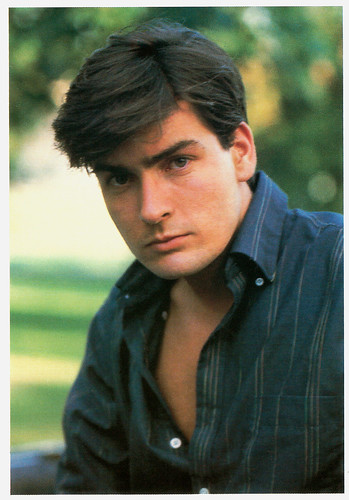
British postcard by Santoro Graphics Ltd., London, no. C285.

British postcard by Reflex Marketing LTD., Wellingborough, England, no. PC 243. Photo: Hemsdale Film Corporation, 1986. Charlie Sheen in Platoon (Oliver Stone, 1986). Caption: The first casualty of war is innocence.
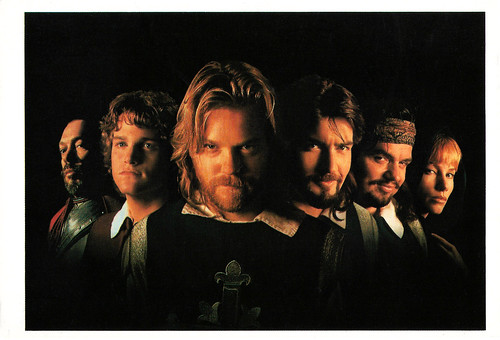
British postcard by Film Review, set H, card 1. Photo: Walt Disney / Buena Vista (UK) International Ltd. Kiefer Sutherland, Charlie Sheen, Chris O'Donnell, Oliver Platt, Tim Curry and Rebecca De Mornay in Three Musketeers (Stephen Herek, 1993). Caption: Disney's contemporary re-telling of a classic adventure.
A young soldier caught in the centre of a moral crisis
Charlie Sheen was born Carlos Irwin Estévez in 1965, in New York City. His father, actor Martin Sheen (born Ramon Antonio Gerard Estevez), was at the time just breaking into the business, with performances on Broadway. His mother, Janet Sheen (née Templeton), was a former New York art student who had met Charlie's father right after he had moved to Manhattan. Martin and Janet had three other children, Emilio Estevez, Renée Estevez, and Ramon Estevez, all of whom became actors. Charlie is the only member of his family to legally change his name to Sheen and pass that new name on to his children.
At a young age, Charlie took an interest in his father's acting career. When he was nine, he was given a small part in his dad's movie The Execution of Private Slovik (Lamont Johnson, 1974). In 1977, he was in the Philippines where his dad suffered a near-fatal heart attack on the set of Apocalypse Now (Francis Ford Coppola, 1979). While at Santa Monica High School, Charlie had two major interests: acting and baseball. Along with his friends, which included Rob Lowe and Sean Penn, he produced and starred in several amateur Super-8 films. On the Vikings baseball team, he was a star shortstop and pitcher. He fought constantly with his older brother Emilio Estevez. He was a good student, but then let his grades slip when he skipped school in high school to play baseball. Just a few weeks before his scheduled graduation date, Charlie was expelled due to poor attendance and bad grades. After high school, Charlie Sheen aggressively pursued many acting roles.
His first major role was as a high school student in the teen war film Red Dawn (John Milius, 1984) starring Patrick Swayze and C. Thomas Howell. He followed this up with relatively small roles in TV movies and low-profile releases. His big break came in 1986 when he starred in the Oscar-winning war epic Platoon (Oliver Stone, 1986). He drew rave reviews for his portrayal of a young soldier who is caught in the centre of a moral crisis in Vietnam. The success of Platoon (1986) prompted Oliver Stone to cast Charlie in his next film Wall Street (Oliver Stone, 1987) alongside Michael Douglas and his father Martin Sheen. The film with its "Greed is Good" theme became an instant hit with viewers. Shortly after, Stone approached Charlie about the starring role in his next movie, Born on the Fourth of July (1989). When Tom Cruise eventually got the part, Sheen ended up hearing the news from his brother Emilio Estevez and not even getting as much as a call from Stone. This led to a fallout, and the two have not worked together since.
The fallout with Stone, however, did nothing to hurt Charlie's career in the late 1980s and early 1990s, as he continued to establish himself as one of the top box office draws with a string of hits that included the biographical Western Young Guns (Christopher Cain, 1988) with his brother Emilio Estevez, the sports comedy Major League (David S. Ward, 1989), the buddy cop film The Rookie (Clint Eastwood, 1990), and the spoof Hot Shots! (Jim Abrahams, 1991). However, as the mid-1990s neared, his good fortune both personally and professionally, soon came to an end.
Around this time, Charlie Sheen, who had already been to drug rehab, was beginning to develop a reputation as a hard-partying, womaniser. In 1995, the same year he was briefly married to model Donna Peele, he was called to testify at the trial of Hollywood madam Heidi Fleiss. At the trial, while under oath he admitted to spending nearly $50,000 on 27 of Fleiss' $2,500-a-night prostitutes. His downward spiral continued the following year when his ex-girlfriend Brittany Ashland filed charges claiming that he physically abused her. He was later charged with misdemeanour battery to which he pleaded no contest and was given a year's suspended sentence, two years probation, and a $2,800 fine. He finally hit rock bottom in May 1998 when he was hospitalised in Thousand Oaks, California, following a near-fatal drug overdose. Later that month, he was ordered back to the drug rehab centre, which he had previously left after one day. During this stretch, Charlie's film career began to suffer as well. He starred in a series of box office flops that included The Arrival (David Twohy, 1996) and Shadow Conspiracy (George P. Cosmatos, 1997). However as the 1990s came to an end, so did Charlie's string of bad luck.
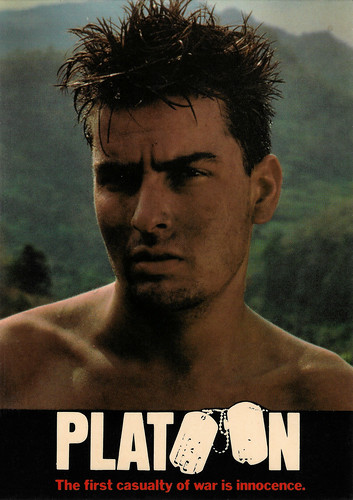
British postcard by Reflex Marketing LTD, Wellingborough, no. PC 244. Photo: Hemdale Film Corporation, 1986. Charlie Sheen in Platoon (Oliver Stone, 1986). Caption: The first casualty of war is innocence.

French postcard by Humour a la Carte, Paris, no. A-C 1253. Charlie Sheen in Platoon (Oliver Stone, 1986).
The highest-paid comedy star on television
In 2000, Charlie Sheen, now clean and sober, was chosen to replace Michael J. Fox on the ABC hit sitcom Spin City (1996). Though his stint lasted only two seasons, Charlie's performance caught the eye of CBS executives who in 2003 were looking for an established star to help carry their Monday night lineup of sitcoms that included Everybody Loves Raymond (1996). The sitcom Two and a Half Men (2003) starred Charlie as a swinging, irresponsible womaniser whose life changes when his nephew suddenly appears on his doorstep.
The show became a huge hit, breathing much-needed life into Charlie's fading career. He gained three Emmy Award nominations and two Golden Globe award nominations. Charlie's personal life also appeared to be improving. In 2002, he married actress Denise Richards, whom he first met while shooting the film Good Advice (Steve Rash, 2001). In 2004, they had a daughter, Sam, and it was announced shortly after that Denise was pregnant with the couple's second child. By all reports, the couple seemed to be very happy together. However, like all of Charlie's previous relationships, the stability did not last long.
In March of 2005, Denise, who was six months pregnant, filed for divorce, citing irreconcilable differences. She gave birth to a second daughter, Lola, in June of that same year. Their divorce became final in late 2006. At the time, he was the highest-paid comedy star on television. He earned $350,000 per episode for Two and a Half Men, and during his eighth and final season on the show, Sheen even earned $1.8 million per episode. In 2008, he married Brooke Mueller. They had also two children, twin sons Bob Sheen and Max Sheen (2009). He checked himself into a rehab facility about a domestic violence assault on his wife in late 2009. However, the couple divorced in 2011.
In March 2011, his contract for Two and a Half Men was terminated by CBS and Warner Bros. following his derogatory comments about the series creator, Chuck Lorre. He was replaced by Ashton Kutcher. In 2015, he admitted his HIV-positive condition during an interview with Matt Lauer on the TV Show Today, in which he said that he was diagnosed four years ago. He chose to go public to stop people from blackmailing him for money. He had another success with the TV Sitcom Anger Management (2012-2014), the spin-off of the film of the same name. But the film 9/11 (Martin Guigui, 2017) was a notorious box office flop.
In 2017, Sheen sued the National Enquirer over a story alleging that, in 1986, the then 19-year-old actor raped his 13-year-old co-star Corey Haim on the set of Lucas (David Seltzer, 1986). The case was settled in 2018. Haim's mother, Judy Haim, identified a different actor as her son's rapist on The Dr. Oz Show, and told Entertainment Tonight that Sheen never raped her son, calling the claims "made up". In 2020, actor Corey Feldman repeated the claim that Sheen raped Haim in his documentary '(My) Truth: The Rape of Two Coreys', corroborated by Feldman's ex-wife Susie Feldman and his Lost Boys (Joel Schumacher, 1987) co-star Jamison Newlander. Sheen, through his publicist, denied the allegations, calling them "sick, twisted and outlandish".
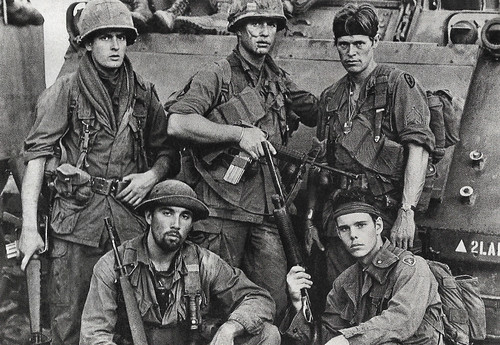
French postcard by Humour a la Carte, Paris, no. A-C 1256. Charlie Sheen, Tom Berenger and Willem Dafoe (top row) in Platoon (Oliver Stone, 1986). Bottom row: Francesco Quinn and Kevin Dillon.
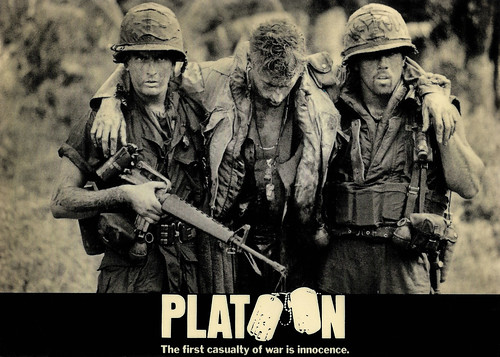
British postcard by Reflex Marketing LTD, Wellingborough, no. PC 245. Photo: Hemdale Film Corporation, 1986. Charlie Sheen in Platoon (Oliver Stone, 1986). Caption: The first casualty of war is innocence.
Sources: Wikipedia and IMDb.
No comments:
Post a Comment